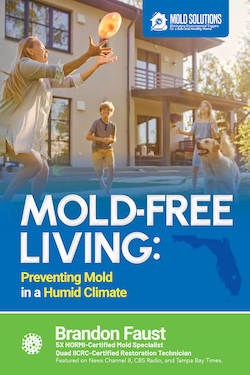There are no laws specifically against selling a moldy home in Florida
In Florida, the humid climate can often lead to the presence of mold in homes, raising concerns for homeowners looking to sell their property.
If you’re contemplating selling your Florida home and it has mold, it may be reassuring to know that it is legal to do so. (Of course, please consult a licensed attorney, but that is currently the case.)
But if you’re the one buying a home, that legal loophole can be a nightmare for you.
If you’re concerned about Mold, Mildew, or Water Damage in a home you are about to buy, call Mold Solutions in Clearwater, Florida. We can help you avoid any potential nightmares, or more often, simply help show you that the mold scene at your future home isn’t bad, better informing your home purchasing process.
Call us at (727) 276-4787.
But sellers do have mold-related obligations and disclosures to make, where warranted
Seller — Despite the lack of explicit laws that prevent you from selling a home with mold, you have an obligation to disclose any significant known property issues to potential buyers, and that can include past water damage (which will spawn mold), as well as current mold growth.
Painting over a mold problem as you prepare to put your house on the market will not only not work in your favor, but it can actually have the exact opposite effect, as it could be seen as an effort to hide potentially dangerous aspect of your home from your future buyer.
This disclosure is crucial as mold can cause health problems, especially in sensitive individuals, and buyers have a right to be informed about the condition of the home they are considering.

When you decide to sell your home, understanding the legal requirements for disclosure and the potential impact of mold on the transaction is essential. Florida law doesn’t prevent you from selling a property with mold, but nondisclosure of such information may result in legal liabilities. Buyers in Florida can use form CRSP-16, a Mold Inspection Addendum, to address mold-related concerns during the transaction process. It’s crucial to address any moisture issues that may contribute to mold growth, as this can affect the value and insurability of your home.
Legal Overview of Selling Property with Mold in Florida

When you’re considering selling a property in Florida, it’s important to understand the legal requirements regarding mold disclosure. Florida law mandates that you, as the seller, disclose any significant property defects which are not readily observable and could materially affect the value of the property. Mold, which can be a serious issue, certainly falls under this category.
According to the precedent set by the case of Johnson v. Davis, if you know of mold in your home, you are required to inform potential buyers of its presence. However, it’s critical to note that this obligation pertains to knowledge you actually possess—there’s no legal requirement for you to actively search for mold before selling your home.
The presence of mold in your Florida property does not legally prevent you from selling; you can indeed sell your house with mold. Although, you should be aware that there are no state laws explicitly requiring mold disclosure, prospective buyers could pursue legal action if they later discover mold that you were aware of and did not disclose.
Furthermore, selling to cash buyers such as Homeinc can simplify the process, as they often purchase homes ‘as-is’, potentially minimizing your liability for disclosure.
Remember, when dealing with mold, it’s always best to be upfront to avoid potential disputes. Consulting a real estate attorney can provide you with tailored advice and help ensure that your sale complies with all pertinent Florida laws.
Disclosure Requirements for Mold in Florida Real Estate

In Florida, you, as a seller, have a legal obligation to disclose certain conditions regarding residential property, which include mold. This stems from the principle that any non-obvious defects affecting the value or desirability of the property must be communicated to potential buyers. The foundation for this requirement was set by the case of Johnson v. Davis, which asserted the importance of disclosing substantial facts hidden from plain view.
Mold Disclosure Specifics:
- Health Impact: You must disclose if the property has had past or present mold issues, as mold can significantly affect sensitive individuals’ health.
- Presence of Mold: Unlike lead paint disclosures, there is no specific statute for mold contamination disclosure in rentals; however, if selling, disclosure is mandated.
- Latent Defects: Only hidden defects, known as “latent defects,” are required to be disclosed. For instance, defects that cannot be identified by a buyer during a normal inspection.
Key Points to Remember:
- Always disclose known mold issues.
- Non-obvious defects like mold must be communicated even though there are no explicit federal laws on mold disclosure.
- Not all defects need to be disclosed; only latent defects must be shared with potential buyers.
Failure to disclose such information can lead to legal consequences, as your duty as a seller is to ensure the buyer is fully informed about the property’s condition. It’s crucial to provide transparent and honest disclosures to maintain integrity in the transaction and avoid future legal issues.
Consequences of Non-Disclosure for Sellers

When you sell a house in Florida, you’re legally required to disclose the presence of mold to potential buyers. Failing to inform buyers about mold issues can lead to significant legal repercussions for you as the seller.
Legal Action: Buyers may take legal action if they discover undisclosed mold after the purchase. This could range from small claims court to more extensive civil litigation, depending on the severity of the mold issue and related damages.
Compensation Claims:
- Repair Costs: You could be responsible for the cost of mold removal and repair to the property.
- Health Issues: If mold exposure leads to health problems for the buyer, you might face claims for medical expenses.
- Diminished Value: The buyer can argue that the home’s value is reduced due to mold, seeking compensation for the loss.
Financial Impact:
- Legal Fees: Regardless of the outcome, you will incur legal costs.
- Damages: You may be ordered to pay not just for repairs, but also punitive damages if found guilty of intentional nondisclosure.
Reputational Damage: As a seller, your reputation in the real estate market can suffer, jeopardizing future transactions.
Revocation of the Sale: In extreme cases, the sale could be rescinded, putting you back at square one and needing to address the mold problem before being able to sell the property again.
To mitigate these risks, it’s essential to be forthcoming about any known mold issues. Transparency not only ensures compliance with Florida law but also helps maintain trust in your transactions.
Mold Inspection and Remediation Process

When considering the sale of a home with mold in Florida, it’s important to understand the inspection and remediation process. Initially, you’ll want to hire a professional to conduct a thorough mold inspection of your property. They’ll assess the extent of the mold growth and identify the source of moisture causing the problem.
Mold remediation is the next step, which involves:
- Containing the area to prevent mold spores from spreading.
- Filtering the air using HEPA vacuums and air scrubbers.
- Removing any water-damaged and mold-infected materials.
- Cleaning remaining surfaces with appropriate biocide or fungicide.
- Drying the area thoroughly to ensure no residual moisture remains.
If the infestation is less than 10 square feet, consider addressing it yourself, maintaining safety by using protective gear like gloves and masks.
| Do’s | Don’ts |
|---|---|
| Wear PPE | Ignore safety procedures |
| Isolate area | Disturb mold without containment |
| Consult professionals | Underestimate extent of mold |
The effectiveness of DIY methods, however, pales in comparison to professional services, and larger affected areas should prompt you to seek expert help. After remediation, ensure you get a follow-up inspection to verify the successful removal of all mold. Remember, disclosing any past or present mold issues is legally required in Florida, so it’s crucial to keep detailed records of the remediation process for potential buyers.
Buyer’s Due Diligence in Mold Detection

When considering the purchase of a home in Florida, you must be vigilant about mold detection. Given the state’s humid climate, mold growth can be a common issue.
Initial Assessment:
- Research: Familiarize yourself with common signs of mold, which include musty odors and visible growth.
- Visual Inspection: During your walkthrough, look for water damage, leaks, or condensation, which can indicate potential mold issues.
Professional Inspection:
- A licensed mold inspector can provide a thorough examination.
- Ensure the inspection covers hidden areas where mold could go unnoticed.
Mold Addendum:
- If applicable, a signed mold addendum might be part of your contract, providing specific terms related to mold discovery.
Your Rights:
- Florida law requires sellers to disclose known mold issues.
- As a buyer, request any previous mold assessments or remediation records.
Negotiation Leverage:
- Discovery of mold can give you leverage in negotiating the price.
- Alternatively, you can request the seller to remediate the mold at their expense before closing.
Remember, your due diligence is key in protecting your health and investment.
Potential Health and Safety Impacts

When considering the sale of your house in Florida with mold, it’s crucial to understand the potential health and safety impacts mold can have. Exposure to mold may lead to a variety of health issues, particularly for individuals with sensitivities or preexisting conditions.
Health Concerns:
- Allergic Reactions: You might experience sneezing, runny nose, red eyes, and skin rash.
- Asthma Attacks: For those with asthma, mold can trigger attacks.
- Irritation: Even without allergies, mold can irritate your eyes, skin, nose, throat, and lungs.
Remember, the severity of these symptoms can range from mild to severe and can be particularly pronounced in the elderly, children, and those with compromised immune systems.
Safety Concerns:
- Structural Damage: Mold doesn’t just affect health; it can also compromise the integrity of your home’s structure if left unchecked.
- Property Value: Ongoing mold problems can reduce the value of your property and pose challenges when selling.
By acknowledging the presence of mold and understanding its impacts, you can take steps to remediate the issue and ensure that your home remains a safe environment. This is not only crucial for your well-being but also for the potential buyers who may be affected by these health and safety concerns upon purchase.
Handling Mold Issues in Real Estate Contracts

When negotiating a real estate contract in Florida, addressing mold issues is a critical aspect of the process. As a seller, you’re legally obliged to disclose any known mold problems inside the property. This requirement ensures transparency and protects both parties in the transaction.
Disclosure Requirements
- Inform the buyer: Disclose any known mold in writing.
- Be specific: Document the location and severity of the mold.
- Professional assessments: Consider including certified mold inspection reports.
Contractual Clauses
- Mold contingency clause: Allows the buyer to back out if mold is discovered.
- As-is clause: Indicates the buyer accepts the property in its current condition.
When dealing with mold, it’s important to remember that remediation can be a negotiating point. Buyers may request repair credits or demand remediation before closing. As a seller, you may opt to perform the repairs yourself or adjust the sale price to account for mold removal costs.
If mold is discovered after the sale, buyers in Florida may have legal recourse if the issue was known and not disclosed. Legal consequences can be severe for hiding known defects such as mold.
In summary, addressing mold issues upfront and incorporating explicit terms into the real estate contract minimizes the risk of future disputes and helps ensure a fair deal for both parties. Always consider consulting a real estate attorney to ensure that all disclosures and contract clauses comply with Florida’s laws.
Insurance Considerations for Mold in Properties

When you own property in Florida, understanding your insurance policy’s stance on mold is crucial. Typically, home insurance policies in Florida cover mold damage only if it’s a result of a ‘covered peril’.
- Covered Perils: These usually include events like fire, lightning, or a sudden accidental issue like a burst pipe.
- Mold Endorsements: For broader coverage, you may want to consider adding a mold endorsement to your policy. This can increase your protection but also your premiums.
It’s important to review your policy’s limitations and exclusions. Here’s a typical breakdown:
- Limitations: Most policies have a cap on mold-related claims, often ranging from $1,000 to $10,000.
- Exclusions: Routine maintenance issues leading to mold growth, like persistent humidity or leaks, are often not covered.
In Florida, insurers are quite strict with mold claims due to the state’s high humidity and propensity for mold growth. Having proper ventilation, consistent maintenance, and a humidity control system can prevent mold and make your property more insurable.
Bear in mind that if you’re selling a home with known mold, this information must be disclosed. Buyers may find it challenging to obtain insurance for a home with a history of mold without adequate remediation documentation.
Quick Actions You Can Take:
- Review Your Policy: Understand what is and isn’t covered regarding mold.
- Preventive Measures: Implement maintenance routines to preclude mold growth.
- Documentation: Keep all records of mold remediation and repairs for future reference.
Your insurance agent can provide specific advice on policy options and coverage for your property in Florida regarding mold-related concerns.
Mold Certification and Clearance Reports

When you’re dealing with mold in your Florida home, obtaining a mold certification and clearance report can provide transparency and peace of mind during the selling process. These documents are critical in showing that appropriate measures have been taken to address mold issues.
Mold Certification marks that a professional has inspected the property and confirms the presence of mold. This certificate typically outlines:
- The extent of mold growth
- Areas affected within the property
- Types of mold identified
After mold remediation, you should seek a Clearance Report. This is a formal document indicating that the mold has been successfully removed to acceptable levels. The clearance report involves:
- A post-remediation inspection
- Detailed findings compared to pre-remediation status
- Laboratory results from air and surface tests
To ensure validity and protect your interests:
- Always use licensed professionals for mold inspections and remediation.
- Ensure the remediator provides a detailed plan and follows EPA or IICRC guidelines.
- Post-remediation, have an independent inspector verify the work and provide the clearance report.
Remember, in Florida, you are required to disclose past or present mold issues when selling your home. Possessing a clearance report can reassure potential buyers that the problem has been professionally dealt with, making it easier to proceed with the sale.
Tips for Selling a House with Mold
If you’re selling a house with mold in Florida, being forthright and compliant with state regulations is key. Here are a few practical tips:
1. Disclose the Mold: Florida law requires you to disclose significant property defects, including mold, to potential buyers. Prepare a written statement detailing the extent of the mold problem.
2. Conduct a Mold Inspection: Hire a professional to conduct a thorough mold inspection. This will provide you with an official report that you can present to buyers, instilling trust in the transaction.
3. Consider Professional Remediation: While not legally required, remediation can increase your home’s marketability. For serious mold issues, professional remediation might be best to ensure that the mold is fully eradicated.
4. Price Accordingly: If you decide not to remediate, set a sale price that reflects the cost of mold removal. Buyers will appreciate the transparency and may be more willing to undertake the remediation themselves.
5. Maintain Proper Documentation: Keep all records of mold-related repairs and inspections. Prospective buyers will likely ask for these documents to assess the situation.
6. Market with Honesty: Promote your property’s positive aspects while being honest about the mold issue. Highlighting recent improvements or unique features can help balance concerns about mold.
Remember, selling a property with mold is entirely possible with the right approach and transparency throughout the selling process.
Florida Mold Laws and Regulations
In Florida, your ability to sell a house with mold is legally permissible. However, you are bound by certain disclosure requirements. Florida Statute 689.261 states that sellers must disclose conditions that materially affect the property’s value that are not readily observable and are unknown to the buyer. This includes mold problems.
When you’re selling a home in Florida, if your property has a history of mold or currently has mold, you must disclose this information to potential buyers. This transparency ensures that buyers are aware of any issues with the property and can make informed decisions. Failure to disclose known mold issues can lead to legal consequences down the line.
If you decide to remediate mold issues before selling, it’s recommended to work with certified professionals. This ensures the mold is handled properly and can provide legal protection, since professional remediation often comes with documentation that verifies the work was completed to current standards.
Here is a brief breakdown of what you need to know:
- Disclosure: Required for known past or present mold issues
- Remediation: Should be performed by professionals for proper documentation
- Legal Risks: Potential for legal action if failures to disclose are discovered
For more in-depth information on Florida’s regulations concerning mold, you can refer to Florida’s Mold Laws – Everything You Need to Know. Remember to review the specifics of these regulations or consult with a legal professional to ensure compliance when selling your property.
Case Studies: Selling Homes with Mold in Florida
When you’re selling a house with mold in Florida, you’re stepping into a situation that requires full transparency. Historical court cases, such as Johnson v. Davis, have clarified the seller’s obligation to disclose substantial issues that could affect a property’s desirability or value—mold included.
Visible and Invisible Mold Concerns
- Visible Mold: Easily detected during a walk-through or home inspection. Must be disclosed.
- Invisible Mold: Harder to detect, possibly behind walls or under floors, but the odor may give it away. Full disclosure is paramount, even if it requires professional inspection to confirm.
Legal Requirements You’re legally permitted to sell a home with mold in Florida; no state or federal laws prohibit this. However, failing to disclose the presence of mold can lead to legal repercussions post-sale. Ethically and legally, disclosure to potential buyers before the transaction is crucial.
Impact on Property Transactions
- Detrimental to Deals: Homes with hazardous or toxic mold can see deals fall through or require price adjustments.
- Professional Remediation: Many sellers opt for professional mold remediation before listing to alleviate concerns and improve marketability.
Mold Remediation vs. As-Is Sale
- Remediation: Can be costly but may result in a better selling price.
- As-Is: Selling the home ‘as is’ might be simpler but will likely attract lower offers.
In your journey of selling a home with mold, consider these case studies as a guide to navigate legal and practical aspects. Remember to consult with a real estate professional familiar with Florida’s specific disclosure laws.










